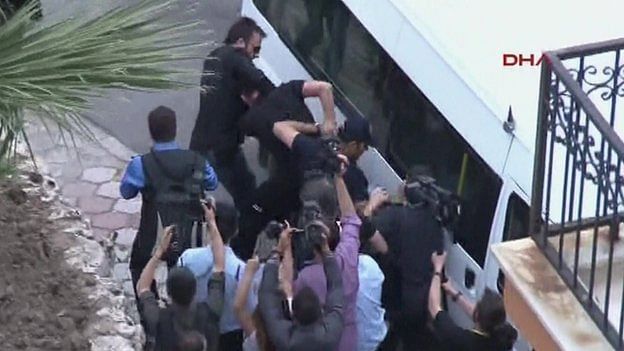Turkish unions call strike protesting mine tragedy

Trade unions in Turkey have announced a one-day strike in protest at the country's worst ever mine disaster which has claimed at least 274 lives.
Union officials said the recent privatisation of the mining sector had made working conditions more dangerous.
Three days of mourning for the victims began on Thursday.
Anger erupted against the government in several cities on Wednesday after the disaster in the western town of Soma on the previous day.
An explosion caused the pit to collapse while more than 700 miners were underground.
Government officials said 363 miners were rescued in the hours after the explosion, but no survivors have been brought out since dawn on Wednesday.
Rescue operations had to be halted for several hours into Thursday morning as high gas concentrations underground needed to be cleared.
Rescuers are still hunting desperately for scores of miners who are missing feared dead, but Energy Minister Taner Yildiz said the mine was still on fire hampering their efforts.
Eighty of those rescued have been treated for injuries, none of which were described as serious.
Turkish riot police use water cannon to disperse protesters at a demo in memory of victims of the Soma mine blast pic.twitter.com/aYm7Q10qpS
— Agence France-Presse (@AFP) May 15, 2014
MARCH CALL
The head of the Confederation of Revolutionary Trade Unions of Turkey told journalists that several major groups of unions had agreed to the strike.
Arzu Cerkezoglu also called on citizens to wear black and march on the Ministry of Labour.
"Those who pursue privatisation... policies, who threaten workers' lives to reduce cost... are the culprits of the Soma massacre and they must be held accountable," said a statement by another group, the Public Workers Unions Confederation.
The Soma mine was privatised in 2005.
An MP from Turkey's opposition CHP party has accused the government of rejecting a recent proposal for a parliamentary inquiry into mine accidents in the area.
However, Reuters news agency quoted the Labour Ministry as saying its officials carried out regular inspections at the mine, most recently in March.
The disaster sparked angry protests in Soma, where people kicked Erdogan's car and called for his resignation after he gave a news conference on the disaster.
He was booed as he emerged from his car. Some arrests were made amid the scuffles and pictures showed the prime minister, surrounded by bodyguards, seeking refuge in a shop. Protesters also attacked the town's ruling AK party offices.
Meanwhile police in the capital, Ankara, fired tear gas and water cannon at about 800 protesters who tried to march from a university to the energy ministry.
In Istanbul police used water cannon to disperse protesters in the main shopping street Istiklal.
Erdogan has faced criticism on social media for being insensitive, after he cited numerous mining accidents throughout the world, including in Britain in the 19th Century, in defending the Turkish government's record.
He said every effort would be made to find the missing miners, and promised a full investigation.
The BBC's James Reynolds in Soma says Mr Erdogan will see this tragedy as a test of his reputation, and he will be aware that the previous government lost an election after being seen to have mishandled the 1999 earthquake.
ELECTRICT FAULT
Energy Minister Taner Yildiz said 787 people had been inside the mine when an electrical fault triggered the blast soon after midday on Tuesday. Many of them died of carbon monoxide poisoning.
Fires were reportedly still burning in the mine 18 hours after the blast.
The electrical fault triggered a power cut, making the mine cages unusable. Those trapped are reported to be 2km (1.2 miles) below the surface and 4km from the mine entrance.
Turkey's worst mining disaster until now was in 1992, when 263 miners were killed near Zonguldak, on the Black Sea.
Coal mining is a major industry in the Soma area, helping to supply a nearby lignite-fired thermal power plant, but safety has long been a concern. Nearly 40% of Turkey's electricity production depends on coal.

 For all latest news, follow The Daily Star's Google News channel.
For all latest news, follow The Daily Star's Google News channel. 




Comments